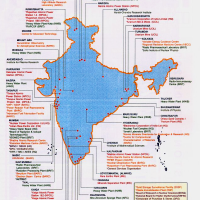All Are Welcome !
Shahari Mahila Kaamgaar Union
(affiliated to National Alliance of People’s Movements)
Invites you to
on
Women in the Unorganised (Unprotected) Sector
in the Era of Globalization
Date: 11th February, 2013, Monday
Time: 11 AM – 5 PM
Venue : Indian Social Institute (ISI), Lodhi Road, Behind Saibaba Mandir, New Delhi
Dear Friends,
The harsh truth is that globalisation, liberalization, privatization and increased mechanization has further deprived a big section of the already marginalised population from access to land, water, forests, dignified livelhood and sources of energy. A powerful minority, old and emergent elite, has further established their empire on the land snatched from the large number of population. Indigenous communities are losing their rights on natural resources. Farm labour is losing out on work due to the extensive use of tractors, harvester and thresher. In this manner people living in rural areas are facing the crisis of livelihood. Henceforth, they are left with no other option than to leave their homes and migrate. It is earn their dignified livelihood, even if meagre, it is only the ‘city’ that they can look to. This city could be any city- Metros such as Mumbai, Kolkata, Chennai, Delhi or smaller cities like Patna, Indore, Nagpur.
Most of the women migrating from rural to urban, end up as domestic workers in the urban middle class families. Some of them take up work as construction labourers, hawkers – vendors etc. considered as ‘unskilled work‘. It’s not only matter of their livelihood but also their right to shelter is under stake when they migrate from their ‘home’ land to a foreign land – cities.
Women working in the unroganiser and unprotected sector face numerous assaults, violence, marginalisation and difficultis and often it is difficult to estaimate the numbers. Like any other work categories it is always difficult to organise them and put up a resistance. It is evident that to fight these atrocities, women domestic workers need to be unioninsed and put up a fight to protect their interest. The ‘Shahri Mahila Kaamgaar Union’ is a step in this direction for several years for the workers in Delhi. The key demands made by the women are the following:
- A uniform law needs to be made for the welfare of domestic workers. Untill then Minimum Wages Act and other Labour laws must be applied to this category of workers too.
- A body comprising of representatives from the government and domestic workers needs to be set up to monitor their real situation.
- The minimum wages, working hours and time of remuneration should be fixed for Domestic Workers. Strict measures should be taken against those who flaunt it.
- Complete profiles of all urban workers, their employers and all organizations linked to them should be done. A government agency should be set up for this purpose.
- Other than weekly, monthly, yearly and sick leave, provisions should be made for emergency leave also for domestic workers. Pregnant workers should be given special leave of three months. All these leaves should be paid.
- Strict punishment should be given to all those employers, placement agents and police personnel who subject domestic workers to physical, sexual and other kinds of abuse.
- Other than financial aid, the government should provide other kinds of human support to those domestic workers who are crisis-struck.
- All kind of middlemen and contractors should be removed between domestic workers and their employers.
- To ensure security of livelihood, domestic workers and their families should be given insurance by the government
- Along with an annual bonus and future investment options, annual wage increase adjusted with inflation should be given to these workers.
It is in this Context that, we are organizing the Public Hearing on “Women in the Unorganised (Unprotected) Sector in the Era of Globalization”. Expected panel for this Hearing includes – Kalyani Menon Sen, Jaya Srivastava, Kalpana Mehta, Subhash Lomte etc. We would welcome your participation in this so that you can not only get involved in their issues but also provide support and strengthen the voices that are raising these demands. And to carry this initiative forward.
Zindabad!
Anita Kapoor, Poonam, Madeena Begum,
Mudra, Lakshmi, Asha
Contact- Anita Kapoor – 09810787686
—
National Alliance of People’s Movements
National Office: Room No. 29-30, 1st floor, ‘A’ Wing, Haji Habib Bldg, Naigaon Cross Road, Dadar (E), Mumbai – 400 014;
Ph: 022-24150529
6/6, Jangpura B, Mathura Road, New Delhi 110014
Phone : 011 26241167 / 24354737 Mobile : 09818905316
Web : www.napm-india.org
Related articles
- A victory against modern day slavery- HRW (kractivist.wordpress.com)
- First-of-its-kind survey compiles the experience of domestic workers, highlights the grim nature of an unregulated industry [The Pump Handle] (scienceblogs.com)
 A poster, front center, showing
A poster, front center, showing 




 I sympathise with the poor families. We are aware of what Mavreick Holdings has done in the case of Garuda Mall. The EWS project has seen a six-year legal battle. It may be difficult to change or cancel the deal as many governments have approved it. I appeal to Bangalore citizens to give us suggestions on what we can do in this matter.
I sympathise with the poor families. We are aware of what Mavreick Holdings has done in the case of Garuda Mall. The EWS project has seen a six-year legal battle. It may be difficult to change or cancel the deal as many governments have approved it. I appeal to Bangalore citizens to give us suggestions on what we can do in this matter.










